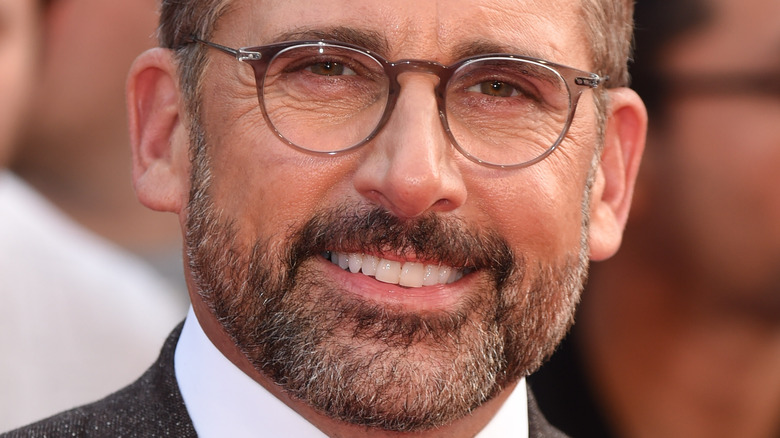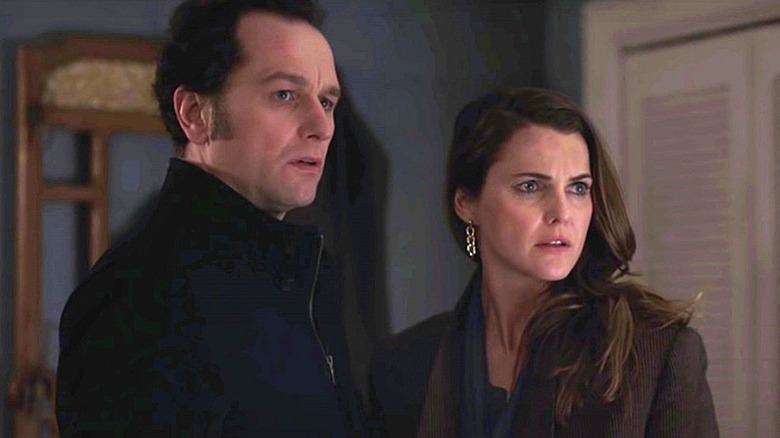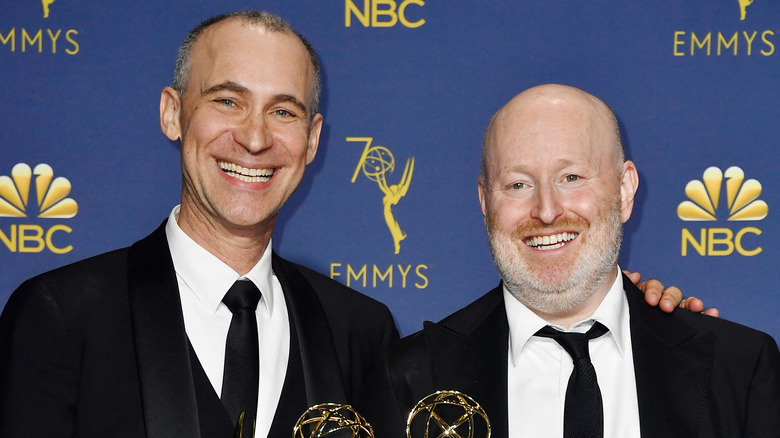Why Steve Carell Accepted A Role For The Patient Before Reading The Script
The fascination with true crime and serial killers is something that has been prevalent in pop culture for quite some time. Showtime begged us to empathize with Dexter Morgan's (Michael C. Hall) aim to rid the world of serial killers, no matter how many people he killed along the way. Now, it's FX's turn to bring audiences into the mind of a serial killer with the miniseries "The Patient." While the story does center around a titular patient with murderous intentions, it's actually Dr. Alan Strauss (Steve Carell) who drives the series forward.
In the first episode, Dr. Strauss is thrown into an unexpected scenario: He meets a serial killer who actually wants to get better. Sam Fortner (Domhnall Gleeson) has been trying out therapy for some time, but since he still has the urge to kill, he feels that his therapist Dr. Strauss should step it up a notch. A clever twist on the serial killer narrative, "The Patient" clearly has attracted some actors with impressive standings. Talented in both the realms of comedy and drama, Carell is an obvious choice for a story with both dark humor and emotions. And according to the actor himself, something special attracted him to the role straight from the jump.
The writers' pedigree spoke for itself
With its reputation for gritty and mature content, FX has aired some of the best television series of the past decade, including the beloved espionage thriller "The Americans." Running from 2013 – 2018, the series stars Keri Russell and Matthew Rhys as Russian spies posing as a suburban American couple in the 1980s. Created by Joe Weisberg, "The Americans" amassed critical acclaim, particularly for its writing. Weisberg shared the showrunning and lead writing duties with Joel Fields and the two joined forces again for "The Patient" (via Variety). While these two series have startlingly different subject matter, "The Americans" is exactly what led Carell into the path of "The Patient."
"First and foremost, Joe [Weisberg] and Joel [Fields] created 'The Americans.' And that's one of my all time favorite shows," Carell reflected to FabTV. "I thought it was brilliant and inventive and so compelling. And when they called and asked me if I would be interested, I pretty much said yes without even looking at it. ...I would have dropped everything to work with them."
Perhaps Carell expected a continuation of "The Americans" when he finally did look at the project, but Weisberg spoke to Deadline in 2018 about the possibility of returning to the series in light of relevant current events in American politics. "[W]e always wrote the show in a bubble," said Weisberg. "The series is the story we firmly painted in the 1980s, and as interesting as the current headlines were, we couldn't let that influence our storytelling. The Audience would feel it and the spell would break."
The creators delve deep into their history in The Patient
Not only is Steve Carell the lead of "The Patient," but he has also clinched an executive producer credit for himself (via IMDb). By all accounts, Carell's faith was not misplaced in the new series. "The Patient" revolves around deeper themes than just murder and mayhem, as outlets such as The A.V. Club have noted. Dr. Strauss not only has the misfortune of being trapped in his patient's basement, but is himself struggling with his place in the world. The doctor is mourning the very recent loss of his wife, as well as the estrangement of his son, who converted from Reform Judaism to Orthodox Judaism (per NPR).
It was important to Joel Fields and Joe Weisberg to portray this type of story and character on-screen. "The Jewish themes are very personal and important to each of us," Fields told The Wrap. "My dad was a rabbi, so I grew up in that world. Joe grew up with a Jewish family as well, so we were able to tap into something very personal for us." Dr. Strauss's conflict with his son and experiences with grief are something that the creators felt was universal, as Fields explained, "I think a big part of our belief as storytellers is that what we're doing is trying to amplify our common humanity."


